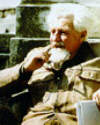 (source)
(source)
|
Konrad Lorenz
(7 Nov 1903 - 27 Feb 1989)
Austrian zoologist.
|
Science Quotes by Konrad Lorenz (13 quotes)
Historians will have to face the fact that natural selection determined the evolution of cultures in the same manner as it did that of species.
— Konrad Lorenz
On Aggression, trans. M. Latzke (1966), 260.
I believe—and human psychologists, particularly psychoanalysts should test this—that present-day civilized man suffers from insufficient discharge of his aggressive drive. It is more than probable that the evil effects of the human aggressive drives, explained by Sigmund Freud as the results of a special death wish, simply derive from the fact that in prehistoric times intra-specific selection bred into man a measure of aggression drive for which in the social order today he finds no adequate outlet.
— Konrad Lorenz
On Aggression, trans. M. Latzke (1966), 209.
If you confine yourself to this Skinnerian technique, you study nothing but the learning apparatus and you leave out everything that is different in octopi, crustaceans, insects and vertebrates. In other words, you leave out everything that makes a pigeon a pigeon, a rat a rat, a man a man, and, above all, a healthy man healthy and a sick man sick.
— Konrad Lorenz
'Some Psychological Concepts and Issues. A Discussion between Konrad Lorenz and Richard I Evans'. In Richard I. Evans, Konrad Lorenz: The Man and his Ideas (1975), 60.
In nature we find not only that which is expedient, but also everything which is not so inexpedient as to endanger the existence of the species.
— Konrad Lorenz
On Aggression, trans. M. Latzke (1966), 260.
It is a good morning exercise for a research scientist to discard a pet hypothesis every day before breakfast. It keeps him young.
— Konrad Lorenz
On Aggression, trans. M. Latzke (1966), 8.
Man appears to be the missing link between anthropoid apes and human beings.
— Konrad Lorenz
Quoted by John Pfeiffer in 'When Man First Stood Up', New York Times (11 Apr 1965), Sunday magazine, 83.
More than any other product of human scientific culture scientific knowledge is the collective property of all mankind.
— Konrad Lorenz
In On Aggression (2002), 279.
Scientific truth is universal, because it is only discovered by the human brain and not made by it, as art is.
— Konrad Lorenz
In On Aggression (2002), 279.
The neuro-physiological organization which we call instinct functions in a blindly mechanical way, particularly apparent when its function goes wrong.
— Konrad Lorenz
On Aggression, trans. M. Latzke (1966), 73.
The scientist knows very well that he is approaching ultimate truth only in an asymptotic curve and is barred from ever reaching it; but at the same time he is proudly aware of being indeed able to determine whether a statement is a nearer or a less near approach to the truth.
— Konrad Lorenz
In On Aggression (1966, 2002), 279.
This is a classical example of the process which we call, with Tinbergen, a redirected activity. It is characterized by the fact that an activity is released by one object but discharged at another, because the first one, while presenting stimuli specifically eliciting the response, simultaneously emits others which inhibit its discharge. A human example is furnished by the man who is very angry with someone and hits the table instead of the other man's jaw, because inhibition prevents him from doing so, although his pent-up anger, like the pressure within a volcano, demands outlet.
— Konrad Lorenz
On Aggression, trans. M. Latzke (1966), 145.
Truth in science can be defined as the working hypothesis best suited to open the way to the next better one.
— Konrad Lorenz
In On Aggression (1966, 2002), 279.
Visualize yourself confronted with the task of killing, one after the other, a cabbage, a fly, a fish, a lizard, a guinea pig, a cat, a dog, a monkey and a baby chimpanzee. In the unlikely case that you should experience no greater inhibitions in killing the chimpanzee than in destroying the cabbage or the fly, my advice to you is to commit suicide at your earliest possible convenience, because you are a weird monstrosity and a public danger.
— Konrad Lorenz
'The Enmity Between Generations and Its Probable Ethological Causes'. In Richard I. Evans, Konrad Lorenz: The Man and his Ideas (1975), 227.
See also:
- 7 Nov - short biography, births, deaths and events on date of Lorenz's birth.
 In science it often happens that scientists say, 'You know that's a really good argument; my position is mistaken,' and then they would actually change their minds and you never hear that old view from them again. They really do it. It doesn't happen as often as it should, because scientists are human and change is sometimes painful. But it happens every day. I cannot recall the last time something like that happened in politics or religion.
(1987) --
In science it often happens that scientists say, 'You know that's a really good argument; my position is mistaken,' and then they would actually change their minds and you never hear that old view from them again. They really do it. It doesn't happen as often as it should, because scientists are human and change is sometimes painful. But it happens every day. I cannot recall the last time something like that happened in politics or religion.
(1987) -- 


